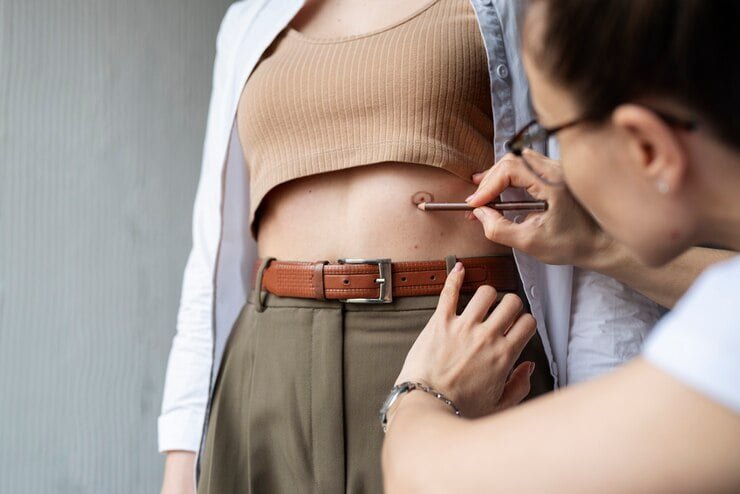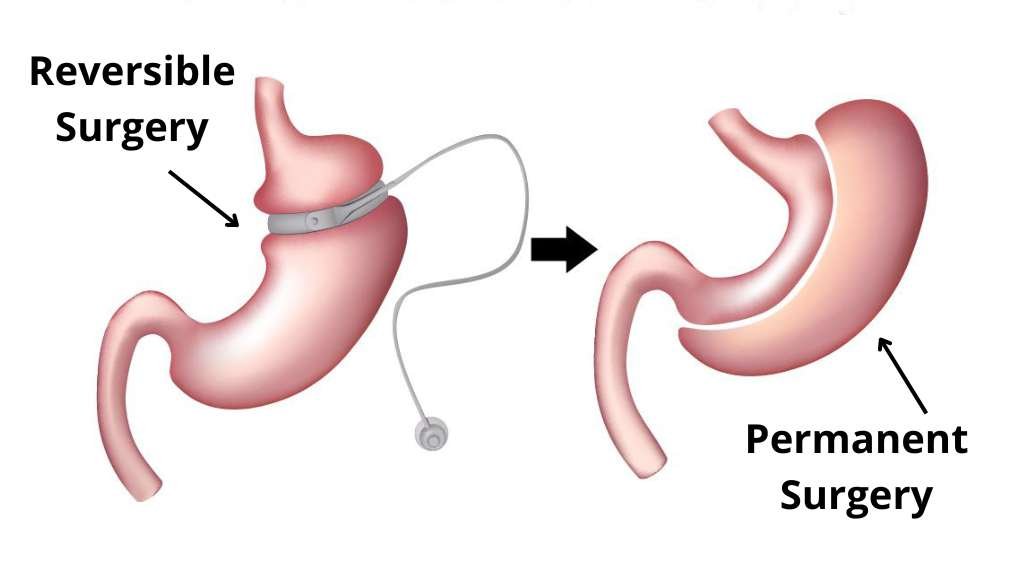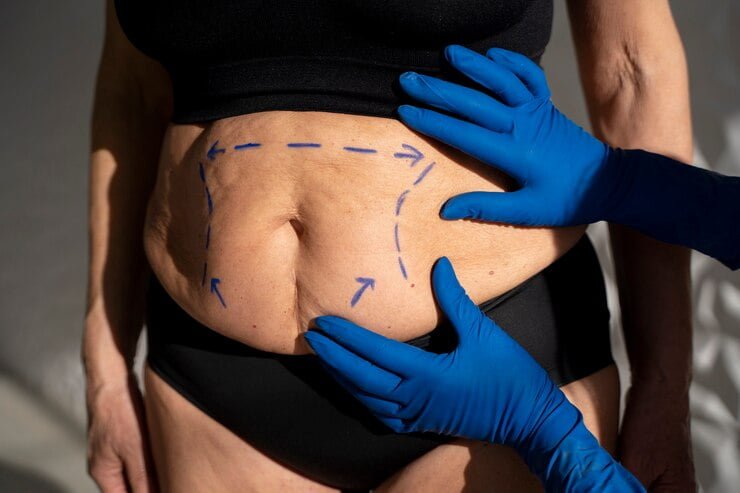Gastric sleeve surgery, also known as sleeve gastrectomy, is a surgical procedure that aims at the removal of elongatedly shaped greater part of stomach to make a smaller stomach pouch with the shape of a sleeve. It is very powerful for obesity treatment and can usually obtain significant weight loss as well as reduce obesity – related health issues among the patients. Although, the question may be raised of whether gastric sleeve surgery is reversible for certain patients. In this blog post, we will look at the topic in detail and mention a few fears regarding the reversal of gastric sleeve surgery.
Process of Gastric Sleeve Surgery
So, before we talk about the reversibility of gastric sleeve surgery, let us understand how the operation actually works. Within a gastric sleeve surgery, 75-80% of the stomach is removed and left as a smaller stomach pocket or a sleeve. This prevents a person from eating more than the expected amount which lowers the calorie intake and triggers weight loss.
Is the gastric sleeve a reversible procedure?
The main difference between gastric sleeve surgery and gastric band surgery is that the removal of a portion of the stomach can be difficult or even impossible to undo because of the procedure’s irreversibility. While gastric sleeve surgery differs from some other weight loss surgeries, like the gastric band, which can be taken out or adjusted, the portion of the stomach, which is removed during gastric sleeve surgery cannot be restored.
Concerns About Reversing Gastric Sleeve Surgery
While gastric sleeve surgery cannot be reversed, there are some common concerns and considerations to keep in mind:While gastric sleeve surgery cannot be reversed, there are some common concerns and considerations to keep in mind:
Weight Regain
Some people could have concerns regarding the gaining of weight after the gastric sleeve surgery, particularly if they do not get satisfied with their weight loss result. However it is important to keep the fact of weighing again after any sort of weight loss plan in mind and it may require additional aids like dietary changes or revision surgery.
Nutritional Deficiencies
Gastric sleeve surgery will affect nutrient absorption rate and will cause deficiencies in certain vitamins and minerals – for example, B12, iron, and calcium. Reversing the procedure will not automatically solve the digetive system defects and will most probably reveal the altered anatomy of the digestive system after the sleeve is removed.
Potential Risks
There are the risks associated with repeating gastric sleeve operation as well, including those linked to complication of the surgery, anesthesia risks and alteration in digestive functions. It is important to have this conversation with your healthcare provider prior to the consideration of any surgical treatment.
Alternative Options for Revision Surgery
While gastric sleeve surgery cannot be reversed, individuals experiencing complications or unsatisfactory outcomes after surgery have alternative options available. These include:
Gastric Bypass Revision
Some patients might require their gastric sleeve transformed to a gastric bypass through surgical procedures known as gastric bypass revision. This process includes rearrangement of the digestive route which bypasses certain areas of the stomach and duodenum; therefore, the patient experiences more weight loss and favorable metabolic effects.
Sleeve Gastrectomy Revision
Another possibility is the sleeve redesignation or reduction, which may involve an enlargement, or an addressing of complications like sleeve extension or reflux. By designing the right aftercare program, we hope to achieve the best possible weight loss outcomes and aid any problems that might occur post-surgery.
Gastric sleeve surgery cannot simply be reversed after it has been performed due to its permanent nature. While some individuals might worry about the reversibility of gastric sleeve surgery, focusing on long-term lifestyle modifications and adhering to post-surgery instructions is critical for maximizing weight loss results and improving general health.
Cayra Clinic is committed to offering reliable guidance and post-operation support to those having gastric sleeve surgery. Contact us now to set up a consultation and learn more about gastric sleeve surgery and how it may help you accomplish your weight reduction goals successfully.
FAQs
1. Can gastric sleeve surgery be reversed?
No, gastric sleeve surgery is not reversible. During the procedure, a significant portion of the stomach is permanently removed, making it impossible to restore the stomach to its original size and shape.
2. Why is gastric sleeve surgery irreversible?
Gastric sleeve surgery involves the removal of 75-80% of the stomach, which cannot be reattached or regrown. This is different from adjustable procedures like the gastric band, where the device can be removed or adjusted.
3. What are the alternatives if I am not satisfied with my gastric sleeve surgery results?
If you experience complications or are not satisfied with your weight loss results, there are alternative surgical options, such as converting to a gastric bypass or undergoing a sleeve gastrectomy revision to address issues like sleeve dilation or reflux.
4. Can weight regain occur after gastric sleeve surgery?
Yes, weight regain can occur if patients do not adhere to dietary guidelines and lifestyle changes. It may require additional support such as nutritional counseling or, in some cases, revision surgery.
5. What are the risks associated with revision surgery?
Revision surgeries carry risks, including surgical complications, anesthesia risks, and changes in digestive functions. It is essential to discuss these risks with your healthcare provider before considering any revision procedures.
6. How can I manage nutritional deficiencies after gastric sleeve surgery?
Nutritional deficiencies can occur after gastric sleeve surgery due to reduced nutrient absorption. Regular follow-ups with your healthcare provider, taking prescribed supplements, and monitoring your nutritional intake are crucial for managing these deficiencies.
7. What should I do if I experience complications after gastric sleeve surgery?
If you experience complications after gastric sleeve surgery, contact your healthcare provider immediately. They can evaluate your condition and discuss possible treatments or revision options.
8. Is it possible to undergo another type of bariatric surgery after a gastric sleeve?
Yes, if necessary, patients can undergo another type of bariatric surgery, such as converting to a gastric bypass, to achieve better weight loss results or address complications from the original surgery.
9. How can I ensure long-term success after gastric sleeve surgery?
Long-term success after gastric sleeve surgery involves adhering to a healthy diet, engaging in regular physical activity, attending follow-up appointments, and seeking support from healthcare providers and support groups.
10. Who is a good candidate for revision surgery?
Candidates for revision surgery typically include those who experience significant weight regain, complications such as severe reflux, or insufficient weight loss despite following post-surgery guidelines. Your healthcare provider can help determine if revision surgery is appropriate for you.













